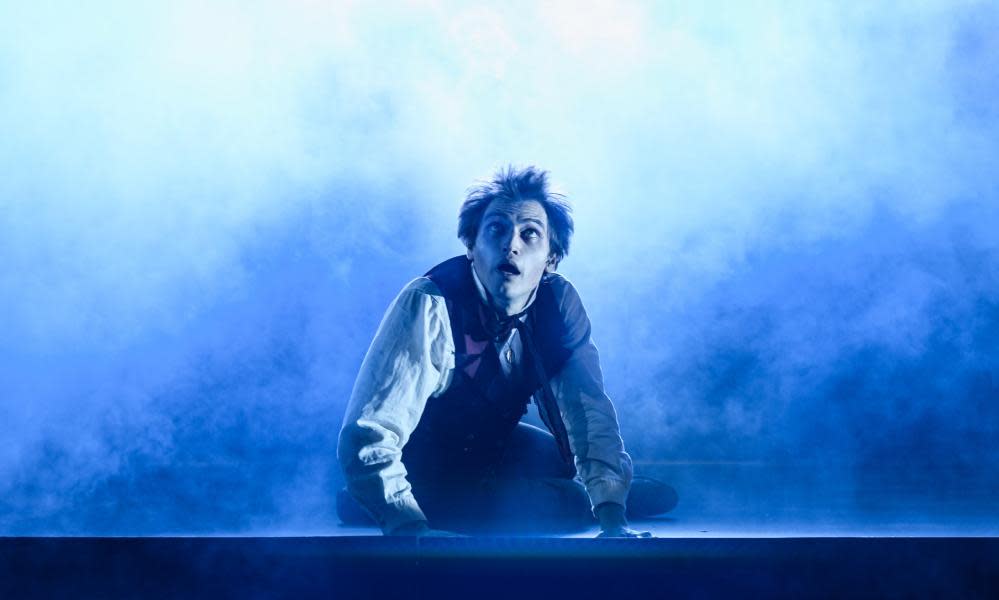There have been many adaptations and permutations of Frankenstein, most recently on the silver screen with Yorgos Lanthimos’s Poor Things. Published in 1818 by a 21-year-old Mary Shelley, the epistolary gothic tale of a scientist reckoning with his monstrous creation has gripped readers for more than two centuries, raising pertinent and thorny questions about ethics, isolation and what it means to be human. In the modern age, the obvious parallel is to artificial intelligence – but there are more surprising resonances in contemporary conversations around toxic masculinity and “incel” resentment.
Independent theatre company Shake and Stir’s stage version, which premiered in Brisbane last year, is a fine addition to the canon. Directed by Nick Skubij and adapted by Nelle Lee, this production is a faithful adaptation of the text, using technology to highlight the story’s backdrop of the Industrial Revolution and the concurrent decay of social relations. It’s an immersive, cinematic production, beginning with a thick cloud of smoke blanketting the stage.

Classical music, from Erik Satie’s Gnossiennes to Claude Debussy’s Clair de Lune, adds ominous beauty and suspense, but silence – an important horror hallmark – is used just as frequently and effectively. Josh McIntosh’s impressive, cavernous set sees stage pieces, including a large ship, emerge from the darkness; a digital backdrop across multiple screens transports viewers to changing worlds, from a university library to the middle of a maze-like forest. These screens are also used to enhance characters’ emotions, bringing to mind Kip Williams’ much-lauded The Picture of Dorian Gray.
Darcy Brown brings a bumbling charm as the increasingly mad scientist Victor Frankenstein. The pivotal scene where the creature (Jeremiah Wray) springs to life is confronting and sensory, with pyrotechnics blasting light across the stage and a chemical smell permeating the room. Wray jerks and contorts, like an animal taking its first steps – a masterful performance as the creature learns to be, then develops an inner life – and anger – of his own.
The creature’s visage is hidden until the second act; Steven Boyle’s prosthetic makeup design breathes frightening life on to Wray’s expressive face. The isolation and torment of both creator and creature play out beautifully in the hands of these two versatile actors, with the supporting cast rotating around them through a nifty stage mechanism. The creature is both pitiable and loathsome.
His need for community and love is palpable: in one touching sequence, he observes and helps a family as the screen depicts seasons changing. But his mounting violence and entitlement is genuinely horrifying, leaving a trail of destruction in his wake. Wray switches seamlessly between these modes – as the creature gains intelligence, the actor recalls Ralph Fiennes’ Voldemort, merciless yet chillingly eloquent.
A flash of humanity among the cruelty is aided at a climactic scene by the wonderful Chloé Zuel as Frankenstein’s bride, Elizabeth. Zuel brings a fire to the character, who also shows rare, and ultimately futile, compassion towards the creature. The show’s production design heightens Frankenstein’s overwhelming sense of claustrophobia and guilt: the screens show pages and pages of handwriting as the scientist plots his creation, brain whirring as the pieces come together.
One scene, where the creator is thrust in front of a curtain on his wedding night, is effective in its use of shadow: the man is constantly haunted by his actions, even in the most intimate moments of his own life. It all adds up to a production that has both style and substance in spades, building a creeping sense of dread and despair. Occasional moments of humour provide slight levity, but this show is largely ruthless, plunging the audience headfirst into Frankenstein’s mad world and forcing a violent consideration of Shelley’s provocations that are only more horrifyingly relevant as the lines between human and machine continue to blur.
.



















